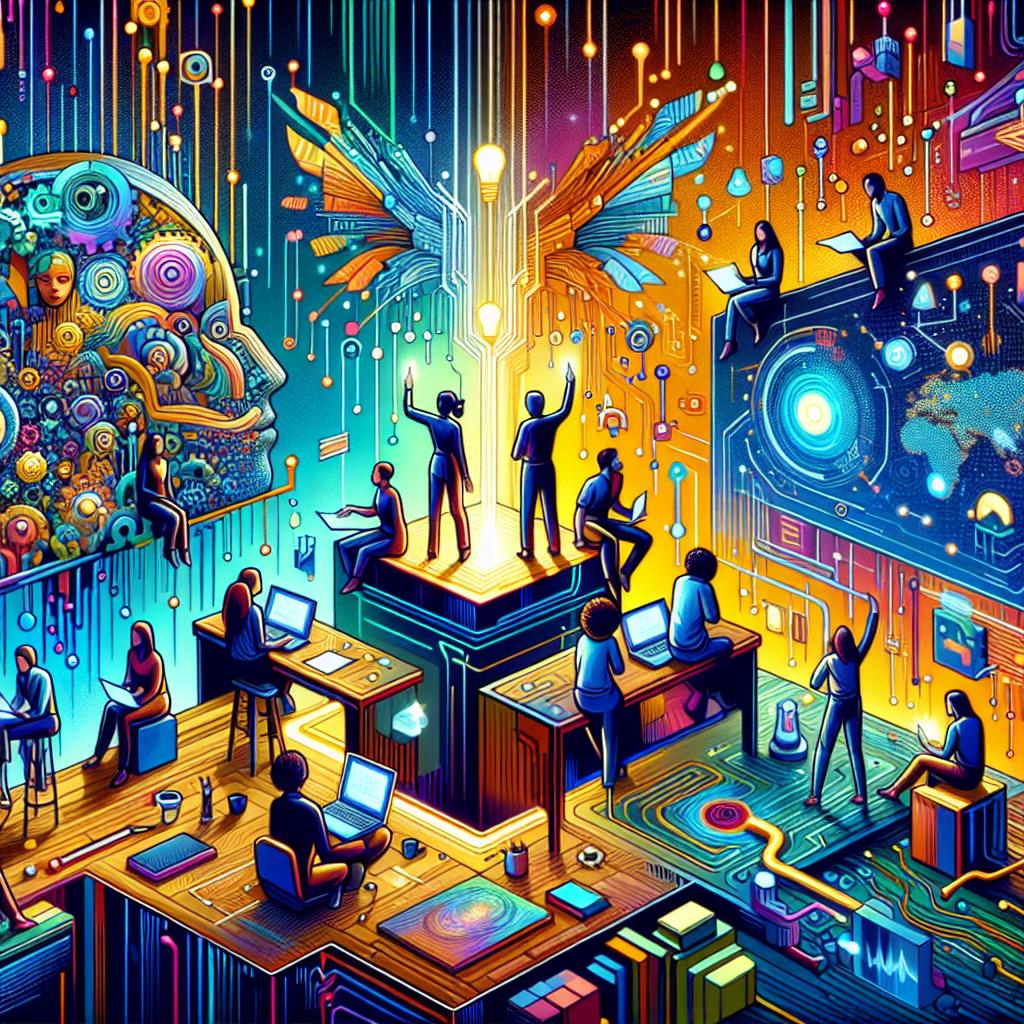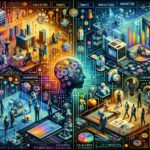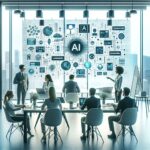TL;DR:
- 'AI for ideas' refers to the use of artificial intelligence to generate, develop, and refine creative concepts, aiding in idea generation, pattern recognition, bias removal, speedy prototyping, and market analysis.
- Startups can leverage 'AI for ideas' to generate innovative business concepts, validate market fit, and streamline product development, enhancing creativity and efficiency.
- Challenges in integrating AI into ideation include ensuring data quality, human oversight, and addressing ethical considerations such as transparency and control.
- The future prospects of 'AI for ideas' involve greater integration into business operations, automation of routine tasks, and the evolution of GPT models demonstrating human-level creativity.
- The collaboration between human creativity and AI enriches creative processes by providing data-driven insights and novel concepts while raising ethical considerations around intellectual property rights and bias minimization.
Ever felt like your creative well has run dry? You're not alone. Aspiring entrepreneurs and innovators often hit that wall, but what if AI could be your secret brainstorm buddy? Imagine harnessing artificial intelligence to not just streamline tasks but to fuel your creativity! This post isn't just about AI for ideas; it's a treasure map to unearthing innovative gold mines within your mind. With AI-powered tools and techniques, you'll discover how to elevate your idea generation process. Dive into the world of enhancing creativity with AI—where tech meets imagination—and unlock a new realm of possibilities. Ready to get inspired? Let’s explore!
Understanding AI for Ideas
In a world where startups thrive on innovation and creativity, artificial intelligence (AI) has become a game-changer. The term 'AI for ideas' might sound like something out of a sci-fi novel, but it's very much a reality in today's digital landscape. Let's dive into what it really means and how it can enhance the creative process.
What is AI for Ideas?
'AI for ideas' refers to the utilization of artificial intelligence to generate, develop, and refine creative concepts. This could range from sparking creativity with AI in various domains like marketing campaigns to inventing new products or services. It's like having an intelligent brainstorming partner that never runs out of suggestions or gets tired.
"Creativity is seeing what everyone else has seen, and thinking what no one else has thought."
This quote encapsulates the essence of using AI for ideas. It helps us look at familiar things through a different lens and come up with unique solutions.
How does AI Enhance Creativity?
The enhancement of creativity by AI occurs through several mechanisms:
Idea Generation
AI algorithms are capable of churning out countless ideas in a matter of seconds. They use data from various sources to come up with combinations that might not be immediately obvious to the human mind. For instance, an AI-powered business idea generator can propose new startup concepts by analyzing emerging market trends and consumer behavior patterns.
Pattern Recognition
One of the strengths of AI is its ability to recognize patterns within large datasets that humans may overlook. This capability can lead to innovative applications in fields such as product design or user experience enhancements.
Removing Bias
Humans are inherently biased based on their experiences and knowledge. However, AI can provide a more objective perspective on idea validation. By leveraging platforms like CheckMyIdea IA, entrepreneurs can get unbiased feedback on their business concepts.
Speedy Prototyping
With tools such as AI concept map generators, startups can quickly visualize their ideas and iterate upon them without the time-consuming process typically associated with prototyping.
Market Analysis
Understanding market needs is crucial when developing new ideas. AI excels at sifting through vast amounts of market research data to pinpoint opportunities for innovation—think along the lines of using an AI YouTube idea generator to identify content gaps on the platform.
Now let's explore these facets more deeply and see how they translate into actionable strategies for startups looking to leverage 'ai for ideas'.
The Role of 'AI for Ideas' in Business Development
For any startup, identifying that next big thing could mean the difference between success and obscurity. That’s where 'ai for ideas' comes into play—transforming fledgling thoughts into fully-fledged business plans ready for action.
Generating Innovative Business Concepts
Using AI as an ideation tool allows startups to break free from conventional thinking patterns. For example, exploring business models through an AI-driven business plan template generator offers fresh perspectives that may have been previously unconsidered.
Validating Market Fit
Once you've got your list of potential blockbuster ideas thanks to your trusty AI companion, it’s time for some hard truths: will they fly in the real world? Using tools like CheckMyIdea IA helps validate these concepts against current market demands and trends.
Streamlining Product Development
Integrating 'ai for ideas' into product development processes ensures efficiency gains by speeding up research phases and enabling rapid prototyping—a boon for startups operating on shoestring budgets or tight timelines.
Overcoming Challenges with 'AI for Ideas'
Despite its many benefits, integrating AI into your ideation process isn't without its challenges:
- Data Quality: The output is only as good as the input; hence ensuring high-quality data feeds is essential.
- Human Oversight: While AI can suggest myriad options, human intuition remains key in selecting viable ones.
- Ethical Considerations: As we delegate more decision-making power to machines, ethical considerations around transparency and control become paramount.
To navigate these challenges successfully, startups should combine human creativity with machine intelligence—forming a symbiotic relationship where each complements the other’s strengths.
Future Prospects: 'AI for Ideas'
Looking ahead, 'ai for ideas' promises even greater integration into everyday business operations—from automating routine tasks so teams can focus on strategic planning (maximizing potential with business idea generator ai) to uncovering hidden opportunities within existing markets (exploring innovative solutions with ai 2024).
Furthermore, developments such as GPT (Generative Pre-trained Transformer) models push boundaries further; recently unveiled GPT versions demonstrate capabilities nearing human-level creativity (revealed: GPT 4 outperforms humans).
Take Away
- 'AI for ideas' acts as an inexhaustible source of inspiration that pushes beyond traditional boundaries.
- Combining human insight with machine-generated suggestions leads to more robust and validated creative outputs.
- Embracing this technology ensures staying ahead in an increasingly competitive landscape driven by innovation.
Leveraging AI for Creative Thinking
In the fast-paced world of startups, innovation is the lifeblood that keeps businesses afloat and propels them into the future. It's no surprise that in today’s digital age, artificial intelligence (AI) has become a crucial player in the arena of creative thinking and idea generation.
AI Tools for Inspiration
Imagine having a brainstorming buddy who never gets tired and can sift through mountains of data in seconds – that's what AI-powered tools can offer. These tools are designed to provide inspiration on demand, helping entrepreneurs break free from traditional thought patterns and explore new horizons.
One such example is an AI-driven business ideas generator. By inputting industry trends, consumer behavior data, and competitive analysis, these generators can produce unique and viable business concepts tailored to your niche market. They help you think outside the box by offering suggestions that might not have crossed your mind otherwise.
"Innovation distinguishes between a leader and a follower."
This anonymous quote encapsulates why startups must embrace innovative technologies like AI for idea generation. As we delve deeper into the capabilities of these tools, it becomes evident that they are more than just fancy gadgets; they are indispensable assets for any forward-thinking entrepreneur.
Enhancing Brainstorming with AI
Brainstorming sessions are vital for fleshing out ideas, but they can also be time-consuming and sometimes unproductive. This is where leveraging AI for creative thinking truly shines. AI doesn't just offer one or two perspectives; it provides a multitude of angles derived from analyzing extensive datasets.
For instance, when considering how to improve customer experience or streamline operations, an AI concept map generator could be invaluable. It helps visualize relationships between different concepts and insights gleaned from customer feedback or market research.
Moreover, integrating AI into brainstorming can accelerate the development process by quickly iterating on ideas with machine learning algorithms. For example, if you're looking to create a new product feature, AI can simulate customer reactions based on historical data before you even prototype it.
Now let's dig into some specific ways startups can use AI to fuel their creativity:
Discover Untapped Market Opportunities
By analyzing social media trends and search engine data, AI-driven analytics platforms can highlight emerging market opportunities before they become mainstream. Startups equipped with this knowledge have a first-mover advantage in capturing these nascent markets.
Refine Product Offerings
Using natural language processing (NLP), startups can gather insights from online reviews and forums about their products or those of competitors. This feedback loop powered by AI sentiment analysis aids in refining product offerings to better meet customer needs.
Foster Collaborative Creativity
Collaboration tools augmented with AI functionalities enable teams to co-create more efficiently. From generating initial ideas using an AI brainstorming assistant to refining them through virtual whiteboards that suggest improvements—collaborative creativity reaches new heights with technology’s touch.
Predict Success Metrics
Predictive analytics models help gauge the potential success of an idea by simulating its performance in various market scenarios. This approach allows entrepreneurs to make informed decisions backed by data rather than relying solely on intuition or past experiences.
As we continue exploring this symbiotic relationship between human ingenuity and artificial intelligence within startup ecosystems, one thing becomes clear: embracing AI is not just about staying current; it's about setting yourself up as an industry pioneer.
Now let's take a closer look at how specific industries are benefiting from these innovative ai solutions:
Healthcare: Medical startups leverage machine learning algorithms to analyze patient data for personalized treatment plans.
Finance: Fintech companies utilize predictive models to assess credit risk more accurately than traditional methods.
Retail: E-commerce ventures employ recommendation engines that personalize shopping experiences for each user.
Education: Edtech initiatives use adaptive learning software that tailors educational content based on individual student progress.
Entertainment: Media startups harness content creation platforms driven by generative design principles which develop original artwork or music compositions autonomously.
These examples only scratch the surface of possibilities when fusing creativity with artificial intelligence across various sectors within startup environments.
Take Away
- Utilizing AI for ideas enables startups to generate unique concepts swiftly while tapping into deep wells of data-driven insights.
- Enhancing brainstorming with AI transforms traditional sessions into dynamic workshops brimming with diverse perspectives offered at lightning speed.
- Incorporating innovative ai solutions across industries not only fuels creativity but also serves as a springboard for becoming industry pioneers armed with cutting-edge technologies.
Applications of AI for Ideas: Revolutionizing Startups
Hello, my entrepreneurial friend! If you're looking to sprinkle a bit of that digital fairy dust on your startup ideas, you've come to the right place. Today, we're diving deep into how artificial intelligence (AI) can transform your brainstorming sessions into a powerhouse of innovation. Whether you're in marketing, product development, or just about any field that thrives on creativity, AI is the secret sauce to cooking up some seriously delicious ideas.
Machine Learning for Brainstorming: A New Creative Partner
Let's kick things off with machine learning – it's like having a brainstorm buddy who never runs out of coffee or ideas. Imagine tools that can sift through data faster than you can say "Eureka!" and offer insights that might take humans ages to uncover. We're talking about ai-driven idea generation that's not only smart but also endlessly resourceful.
Think of it this way: AI algorithms can analyze past trends, current market conditions, and even predict future consumer behavior. It's like having a crystal ball at your disposal, one that gives you a sneak peek into what could be the next big thing in your industry.
"AI has the potential to become an essential partner in creative processes by providing data-driven insights and generating novel concepts beyond human imagination."
Creativity with Artificial Intelligence: The Artistic Side of Tech
Now let's get artsy with AI. Who said tech couldn't be creative? With advanced algorithms capable of composing music, creating art, and even writing poetry, we're seeing the softer side of silicon emerge as a force to be reckoned with.
For startups looking to stand out with unique branding and design elements, AI in product development and design offers an exciting playground. From generating logo designs to suggesting color palettes that resonate with target audiences – AI is becoming an indispensable tool for designers who want to push boundaries and explore new aesthetic territories.
AI in Marketing and Advertising: Personalization at Scale
Marketing mavens, listen up! AI is changing the game when it comes to connecting with customers on a personal level. By harnessing the power of machine learning for brainstorming, marketers can craft campaigns that hit all the right emotional notes without missing a beat.
AI tools analyze consumer behavior down to minute details – what they like, when they shop, how they engage online – allowing brands to create hyper-personalized experiences. And let's not forget chatbots; these virtual assistants are getting so good at conversation; they might just be your next best hire for customer service!
AI in Product Development and Design: Crafting Tomorrow’s Hits Today
Onward to product development! If you think developing hit products is solely based on gut feelings or chance encounters with inspiration – think again. With creativity using artificial intelligence, startups can now leverage vast amounts of data and sophisticated modeling techniques to predict what will make waves before even creating a prototype.
It doesn't stop there; once you have a concept in mind, AI simulation tools allow for virtual testing environments where you can tweak features until perfection (or close enough). These simulations help save time and money while ensuring your product has been vetted through digital trials by fire.
Take Away:
- Machine learning elevates brainstorming, turning raw data into actionable insights for unparalleled idea generation.
- AI breathes new life into creativity, aiding design processes from branding aesthetics to personalized customer experiences.
- Product development gets predictive thanks to simulations powered by artificial intelligence – foresee success before physical creation.
Human Creativity and AI Collaboration
The intersection of human creativity and artificial intelligence (AI) is a frontier that's buzzing with potential. In this space, we're not just talking about machines taking over; we're talking about a partnership that could redefine how we approach creativity. Let's dive into the ways ai for ideas can complement our human spark and address some ethical considerations along the way.
Complementing Human Creativity with AI
Imagine you're sitting with a blank canvas in front of you, or maybe it's a blinking cursor on an empty document. That first step towards creation can sometimes feel like a giant leap. But what if you had a partner that could suggest a starting point based on your past preferences or current trends? This is where AI steps in to enhance our creative processes.
For instance, AI-powered business ideas are revolutionizing the startup world by offering entrepreneurs data-driven insights to spark innovation. These tools analyze market trends, consumer behavior, and even competitor strategies to help you come up with viable business concepts.
Now let's talk about something called 'ideation'. It's one thing to have an idea but molding it into something tangible takes effort. AI tools like idea analysis software help refine these raw thoughts into actionable plans. They can simulate outcomes, provide feedback loops, and even predict market reception.
In content creation, the narrative is king. And guess what? There’s an AI for that too! Tools like GPT-4 have shown remarkable ability in generating human-like text (GPT-4 outperforms humans), which can be used as a base for writers to build upon, enriching their storytelling capabilities without stifling their unique voice.
"AI doesn't replace creativity; it feeds it. It offers us countless possibilities at our fingertips – waiting for our human touch to bring them to life."
When it comes to product development, startups are leveraging AI not only for ideation but also for validation. By using tools like CheckMyIdea IA, entrepreneurs can gauge the potential success of their products before they even hit the market.
Ethical Considerations in AI-augmented Creativity
As much as AI amplifies our creative abilities, it also brings forth questions about originality and ownership. When an AI tool suggests changes or generates content based on existing works, who owns the final product? The user feeding the input or the developers who created the algorithm?
Ethical use of AI also demands transparency – users should know when they're interacting with an AI versus a human (AI vs Robotics: The Ultimate Showdown). Moreover, there’s always the concern around bias; since AIs are trained on datasets that may contain biases, this could inadvertently be reflected in their outputs.
What about job displacement? There's an ongoing debate whether AIs will replace certain roles within creative industries (Debate Intensifies: Is AI Bad Idea?). However, many argue that rather than replacing jobs entirely, AI will shift them towards more strategic tasks while handling repetitive aspects.
Lastly, consider data privacy – with AIs needing vast amounts of data to learn and produce creative work effectively (Analyzing Viability of Business Ideas), ensuring user information remains confidential is paramount.
Take Away
- AI for ideas enriches human creativity by providing new perspectives and data-driven insights.
- Ethical use of AI requires clarity on issues such as authorship rights and bias minimization.
- The integration of AI into creativity shouldn't be feared but embraced as a collaborative force multiplier.
Addressing Ethical Implications in AI for Ideas
In the ever-evolving landscape of technology, artificial intelligence (AI) has emerged as a game-changer for startups and entrepreneurs. The ability to leverage ai for ideas has opened up a new realm of possibilities, making it easier to generate innovative solutions and foster creative thinking. But with great power comes great responsibility, and it's crucial that we address the ethical implications that accompany this digital revolution.
Intellectual Property and AI-generated Ideas
When AI systems are used to generate new concepts or products, questions arise regarding ownership and intellectual property rights. Should an AI-generated idea be patentable? And if so, who owns the patent – the creator of the AI or the user who prompted the output?
"The emergence of AI-generated content challenges our traditional notions of creativity and invention."
This statement highlights a significant shift in how we perceive innovation in the age of AI. As machines become capable of producing work traditionally done by humans, we must reassess our legal frameworks to ensure they keep pace with technological advancements.
For startups looking to use AI-powered business ideas as a cornerstone of their strategy, it's important to navigate these waters carefully. Ensuring proper licensing agreements and understanding the legalities surrounding AI-generated content is paramount. For instance, when using an AI business ideas generator, clarity on IP rights from the outset can prevent future disputes.
Bias and Fairness in AI-generated Concepts
Another critical ethical consideration is bias within AI systems. Since AIs learn from data generated by humans, they can inadvertently perpetuate existing biases present within that data. This could lead to unfairness or discrimination in AI-generated business ideas or product concepts.
Aspiring entrepreneurs must be vigilant about examining their AIs for potential biases – particularly those utilizing tools like AI startup idea generators. It’s essential to employ diverse datasets during machine learning processes and continuously monitor outputs for skewed results.
Overcoming Biases with Diverse Training Data
A practical step towards mitigating bias is feeding your AI system with diverse training data. By doing so, you encourage a broader perspective within generated ideas, reflecting a wide array of cultural and social norms. This approach not only addresses fairness but also enhances creativity by drawing inspiration from various sources.
Ensuring Fairness through Transparency
Transparency in how an AI system operates allows users to understand how decisions are made. When leveraging AI for creative thinking, being transparent about your model's decision-making process can build trust among stakeholders and end-users who may rely on these innovative solutions.
The Role of Startups in Shaping Ethical Use of AI
Startups have an opportunity to lead by example when it comes to ethical uses of AI. By prioritizing ethical considerations at early stages, they set standards for responsible innovation within their industries.
Advocating for Responsible Innovation
Advocacy involves pushing not just for advancements in technology but also for progress in ethical guidelines governing those technologies. Entrepreneurs should actively participate in dialogues around responsible innovation – sharing insights gained from experiences with tools like innovative business plan startup ideas.
Implementing Ethical Guidelines Internally
To truly make an impact, startups must go beyond advocacy; they need to implement ethical guidelines internally. This means establishing clear policies around data usage, privacy protection, transparency measures, and continuous checks against bias – all integral aspects when developing or using any form of business plan idea template.
Take Away
The integration of ai into startup ideation brings complex ethical questions about intellectual property rights that need careful navigation.
####
Entrepreneurs must prioritize eliminating bias within ai algorithms by incorporating diverse datasets and maintaining transparency.
####
Startups have both an opportunity and responsibility to lead the charge toward ethically sound practices in ai development and application.
Conclusion
Frequently Asked Questions
What is AI for ideas?
AI for ideas refers to the use of artificial intelligence technology to generate, refine, or enhance creative concepts, solutions, or innovations.
How does AI for ideas work?
AI for ideas typically involves using machine learning algorithms and natural language processing to analyze large datasets, identify patterns, and generate new ideas or insights based on the input data.
What are the potential applications of AI for ideas?
AI for ideas can be applied in various fields such as marketing, product development, content creation, design, and problem-solving to generate new concepts, optimize processes, and drive innovation.
Can AI for ideas replace human creativity?
AI for ideas is designed to augment human creativity by providing data-driven insights and generating novel concepts. While it can enhance creative processes, it is not intended to replace human creativity entirely.
Are there any ethical considerations related to AI for ideas?
The use of AI for ideas raises ethical considerations related to intellectual property, bias in algorithmic decision-making, and the impact on employment in creative industries. It is important to address these ethical implications when implementing AI for ideas solutions.





Leave a Reply